
|
 |
|
|
Dear Friends and Supporters of Article 9,
We are pleased to send you our quarterly eNewsletter for January - March, 2013 with some information about the Global Article 9 Campaign's recent activities and related developments, amidst intense debate on revising Japan's peace constitution.
|
|
|
NEWS FROM JAPAN - CONSTITUTION DAY MARKED WITH PROTESTS
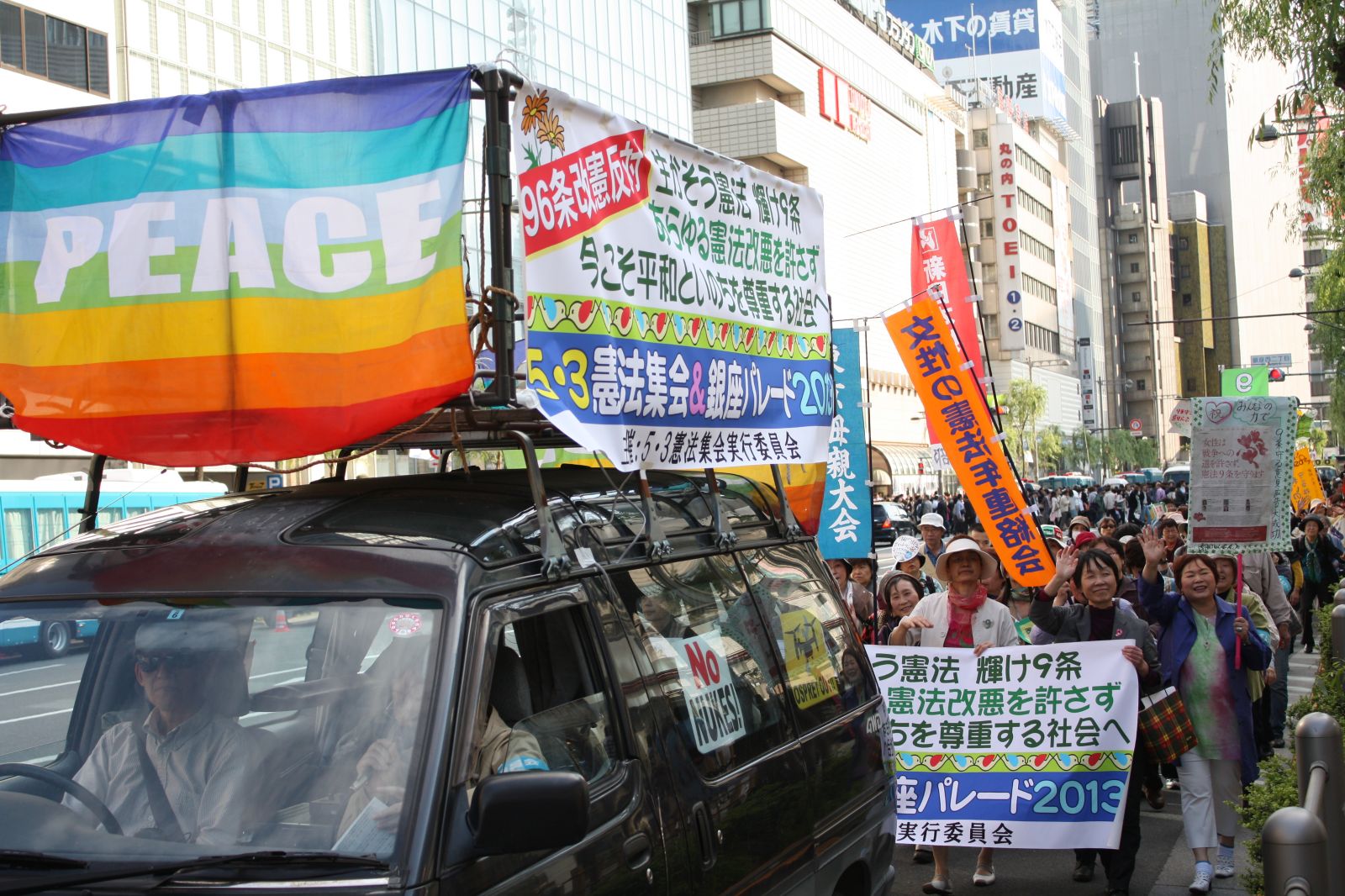 On May 3, 2013, as Japan celebrated the 66th anniversary of the entry into force of its post-WWII pacifist Constitution, gatherings were held all over Japan. On May 3, 2013, as Japan celebrated the 66th anniversary of the entry into force of its post-WWII pacifist Constitution, gatherings were held all over Japan.
Constitution-related events are held every year. However, with the hawkish Abe administration aggressively pushing for constitutional revision as one of the main focuses in the upcoming July Upper-House elections, this year's gatherings were particularly marked by a sense of urgency and a heated atmosphere.
At the Tokyo Metropolitan Hibiya Public Hall, numerous groups opposed to constitutional revision gathered to protest the Abe Shinzo-led Liberal Democratic Party (LDP)'s attempts towards a revision of the constitution and to support the current peace and human rights clauses. With a capacity of 2,000, the hall was full and surrounded by more than 1,000 who couldn't enter.
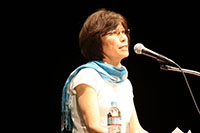 Aileen Mioko Smith of Green Action, in her keynote speech, spoke against the government's attempt to first amend the procedure for constitutional revision. “When people who have power say they want to make it easier to change the constitution, it is the same as them saying that they want to loosen the rules that restrain them,” she warned. Aileen Mioko Smith of Green Action, in her keynote speech, spoke against the government's attempt to first amend the procedure for constitutional revision. “When people who have power say they want to make it easier to change the constitution, it is the same as them saying that they want to loosen the rules that restrain them,” she warned.
The Abe administration has proposed to first revise Article 96 of the constitution, changing from the current two-thirds majority requirement for the National Diet to initiate a national referendum to amend the constitution, to make it a simple majority of the Diet. Abe has made no secret of his intention to push for further constitutional revisions, notably of war-renouncing Article 9, as well as of many other peace and human rights dispositions.
Ms Smith, an active leader on environmental and human rights issues such Minamata Disease and the Fukushima nuclear disaster reminded us that “it is because we have the current constitution (that protects freedom of speech and assembly), that we have been able to take on the state in the battle to move away from nuclear power. There are people fighting for peace in places where they are thrown in prison for even holding such assemblies. I think we are lucky and we should fight also for those who are not as lucky as we are”.
Kato Yutaka, a lawyer and President of the Okinawa Bar Association who has been supporting the battle against military bases in Okinawa, spoke about the situation in Okinawa. “The Osprey aircraft are flying freely in Okinawa now. The promise that they would not fly over civilian housing in the dangerous mode has also been broken. Transferring Futenma base to Henoko because Futenma base is dangerous is unfair too, there are people living in Henoko also. It's not acceptable to say there are fewer people who will be affected therefore it cannot be helped.” However, Mr Kato also believes that there is hope.
“Okinawa's long battle has changed the people of Okinawa. Six years ago they contended the changing of the constitution, however today 51% are opposed to it and only 28% are in favor of a reform, showing an even larger opposition. Furthermore, Okinawa's fighting spirit is spreading through the whole country.”
Leaders of the Japan Communist Party and the Social Democratic Party of Japan also took the floor, appealing that they “want to work together with various groups to stop these initiatives”. Chair of the SDP Fukushima Mizuho explained: "If they can amend the constitution through a simple majority the government will be able to make whatever changes it wants whenever it suits them.” Shii Kazuo of the Japan Communist Party added: "The constitution exists to protect your own rights," he said. "There is a good reason it is not easy to amend it." After the assembly, a parade was held departing from Hibiya Public Hall and finishing near Tokyo Station with participants carrying a banner reading “Stop the change of the constitution for the worse”. A total of 3,500 people joined the march according to figures released by the organizers.
To change or not to change?
In a country where changing the post-war constitution has been considered a political taboo, the LDP, Japan Restoration Party and Your Party have made clear their intention to make constitutional revision a priority for the July Upper House election.
“Most people had believed you cannot hold a national referendum (on revising the constitution) . . . but that possibility may be finally emerging,” claimed Abe at Japan National Press Club in April. “The best opportunity for the nation to discuss it is an election.” On May 3, Abe told the media that constitutional revision “will be a public pledge in the Upper House elections.”
Yet, recent surveys carried out by Japanese leading newspapers show that Japanese public opinion may not support constitutional revision.
According to the Japan Daily Press, 52% of the respondents are opposed to the proposed amendment to Article 96 – a move seen by many as paving the way to revise Article 9. In addition, a poll by the Asahi Shimbun newspaper showed that a majority of respondents oppose an amendment of Article 9 (52% are opposed to changing it, with 39% in favor), the creation of a national defense force (62% opposition, 31% support) and a re-interpretation of the Constitution regarding Japan’s right to collective self-defense, that the country possesses it but cannot exercise it – (56% in favor of maintaining the current stance, and 33% wanting to enable Japan to exercise the right).
At the political level, it is also unclear if Abe will be able to get his way. It would require that the three parties calling for revision (LDP, Japan Restoration Party and Your Party) more than double their representation in the upcoming elections, and win over members of opposition parties that remain divided on the issue. Yet, the Democratic Party of Japan, the largest opposition party, has expressed its opposition to revising Article 96 before holding discussions on other intended changes of the constitution, and the ruling coalition partner New Komeito has shown resistance against easing the criteria for constitutional amendments.
International support for Japan’s peace constitution
The debate over amending Japan’s constitution has not only become one of the most important issues in Japan’s political discussions – ahead of the Upper House elections scheduled in July and for the months to come. It has also turned into a matter of global concern, both regionally and internationally.
A number of international groups and figures have responded to the appeal by the Japanese peace movement by sending messages of support for Japan’s peace constitution, and against the government’s trend to nationalism and its path to militarism. These messages of support were printed and distributed during the May 3rd event.
The power of the people
 In light of the important mobilization and the lack of political backing, Abe’s LDP has been forced to take a step back and announced on May 24 that it would not, after all, include amending Article 96 as part of its campaign pledges for the July Upper House elections. In light of the important mobilization and the lack of political backing, Abe’s LDP has been forced to take a step back and announced on May 24 that it would not, after all, include amending Article 96 as part of its campaign pledges for the July Upper House elections.
If this decision can be seen as a first victory for those who campaign against Abe’s attempts to revise Japan’s peace constitution, observers prefer to interpret the move as a change of strategy aimed at maximizing the LDP’s chances of success in the upcoming elections.
Indeed, party officials have made clear that constitutional reform remains high in the LDP policy platform.
This decision, however, comes as an encouragement to the Japanese peace movement, which remains committed to protect the country’s peace constitution, as the debate promises to last well beyond July.
Read international messages of support here.
For more information about May 3 protests, read this Associated Press article.
Also see the following surveys:
Surveys shows over half of Japanese opposed to Article 96 revision
Asahi poll: 54% against making constitutional revisions easier
For background information about the debate over Article 9, read this piece published in openDemocracy.
|
NUCLEAR DISARMAMENT – 2013 NPT PREPCOM BETWEEN FRUSTRATION AND ENCOURAGEMENTS
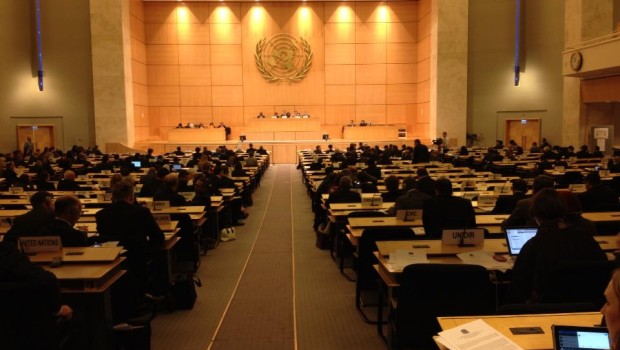 From April 22– May 3, 2013, the 96 states parties to the nuclear Non-Proliferation Treaty (NPT) met in Geneva, Switzerland for the Second Preparatory Committee for the 2015 Review Conference. From April 22– May 3, 2013, the 96 states parties to the nuclear Non-Proliferation Treaty (NPT) met in Geneva, Switzerland for the Second Preparatory Committee for the 2015 Review Conference.
The meeting took place in a context of frustration at the long-lasting stalemate in implementing the NPT and a general sense of failure in achieving nuclear disarmament. Yet, recent events, notably the adoption of the Arms Trade Treaty, the holding of the March 2013 Oslo conference on the Humanitarian Consequences of Nuclear Weapons and the announcement of a follow-up conference in Mexico early next year, contributed to build a sense of momentum among civil society and member-states and generate expectations for a path forward. Catastrophic Humanitarian Consequences
The debate on the humanitarian consequences of nuclear weapons figured as one of the key issues of the meeting.
First mentioned at the 2010 NPT Review Conference, the humanitarian consequences and environmental impact of nuclear weapons have since become part of the international discourse in nuclear disarmament.
At the 2012 NPT meeting in Vienna, Switzerland issued the so-called ‘16 nation’ statement, followed by a similar statement by 35 governments to the UN General Assembly’s First Committee in October 2012. With the participation of 127 states and many international and UN organizations, the March 2013 Oslo conference publicly recognized the catastrophic humanitarian and environmental impact that any use of nuclear weapons would have and concluded that the only way to prevent such catastrophe would be to abolish nuclear weapons.
Building on this momentum, a majority of statements by member-states made reference to the topic on the opening day of NPT Prep-Com. In addition, 80 states issued a joint statement condemning the humanitarian and environmental consequences of nuclear weapons and urging that atomic weapons never be used under any circumstances. The statement was delivered by South Africa’s ambassador Abdul Minty.
According to Beatrice Fihn of Reaching Critical Will, “[n]ever in NPT history has such a large cross-regional group of states delivered a joint statement on one issue.”
Yet, Japan – the only country that has experienced the devastation caused by the use of nuclear weapons on its cities, and despite its peace constitution, Three Non-Nuclear Principles (of not possessing or producing nuclear weapons or allowing them on its territory) and its traditional stance of promoting nuclear disarmament, decided not to join the initiative. The decision was apparently based on the fact that the Japanese government could not agree with the phrase “under any circumstances” from fear that their endorsement would compromise the country’s reliance on the US nuclear umbrella.
In reaction to Japan’s decision, some 100 people from 20 countries, including Hibakusha (survivors of the atomic bombing of Hiroshima and Nagasaki), members of the International Campaign to Ban Nuclear Weapons (ICAN), disarmament activists, students and youth groups, came together and spontaneously organized a peaceful and cheerful march of protest from UN headquarters to the Japanese mission to the Conference on Disarmament.
Mounting frustration
Other key issues at the meeting were the failure to convene a conference on a weapons of mass destruction free zone in the Middle East, which many governments deplored (the Egyptian delegation even walked out of the meeting as a sign of protest); the failure to implement the nuclear disarmament section of the 2010 Action Plan, and the lack of progress in ensuring success at the next review conference to be held in 2015.
Increased interaction with civil society
If the 2013 NPT PrepCom left many with a sense of disappointment, one encouraging development has been the increased dialogue between member-states and civil society organizations.
Notably, the International Campaign to Ban Nuclear Weapons (ICAN) relentlessly carried out – in the lead up and during the NPT meeting – extensive advocacy with governments, both in Geneva and in capitals, to highlight the catastrophic humanitarian consequences of nuclear weapons and encourage member-states to refer to it in their addresses, endorse the joint statement and generally support a treaty banning nuclear weapons.
These efforts were reflected in the factual summary issued by the Chair of the Second PrepCom, Ambassador Cornel Feruta of Romania, (paragraph 37) which “recognised the valuable role played by civil society in the implementation of the objectives of the Treaty” and welcomed “the increased interaction with the civil society during the specific session at the Committee.” The document further expressed member-states’ “appreciation for the information and monitoring reports made available by civil society and academic organizations“ and indicated the interest by a number of states parties in “intensifying engagement with non-governmental organizations.” This development has of course been welcomed by the many civil society groups working on nuclear disarmament issues. Yet, Reaching Critical Will warns that “such increased [civil society] participation comes with a responsibility to listen and work hard for progress”, highlighting that NGO’s engagement in the NPT should not be utilized to sanction the current lack of progress “but to encourage states parties to step up and embrace the momentum to make real changes to the status quo.”
In an editorial published in the NPT News In Review, Beatrice Fihn explains: “This new and positive interaction between civil society and governments in the NPT has not happened by accident. The recent focus on the humanitarian impact of nuclear weapons, through the 2010 NPT outcome document and events outside the NPT, has energized both civil society actors and governments. This energy comes from believing that progress on nuclear weapons now is possible, that we are seeing a momentum growing.”
For more information about the NPT PrepCom, documents, statements and analyses, visit Reaching Critical Will’s dedicated page here.
Read more about the Joint Humanitarian Statement on ICAN’s website here.
For an analysis on the closing of the NPT PrepCom, read Rebecca Johnson on openDemocracy here.
Picture credit: ICAN
|
NORTHEAST ASIA - INFLAMMATORY COMMENTS ON COMFORT WOMEN TRIGGER OUTRAGE
Militarism, chauvinism and sexism often go hand in hand. In Japan today, one could add revisionism to the list, as epitomized by a series of offensive remarks by Japanese right-wing politicians.
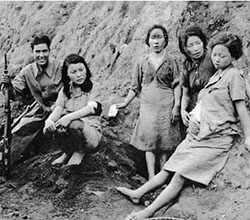 On May 13, Mayor of Osaka and co-leader of the conservative Japan Restoration Party Hashimoto Toru claimed that ‘comfort women’ were “necessary.” On May 13, Mayor of Osaka and co-leader of the conservative Japan Restoration Party Hashimoto Toru claimed that ‘comfort women’ were “necessary.”
‘Comfort women’ is the euphemistic term that refers to the up to 200,000 women, mostly from Korea and China, who were recruited, often abducted, and forced into sexual slavery for the Japanese military forces during World War II.
“In the circumstances in which bullets are flying like rain and wind, the soldiers are running around at the risk of losing their lives. If you want them to have a rest in such a situation, a system like the ‘comfort women’ is necessary. Anyone can understand that,” Hashimoto told reporters.
During a visit to the Futenma US military base, Hashimoto did persist and sign, suggesting to the US military Commander in Okinawa that Marines use legalized sexual services as a way to keep their sexual appetites under control and reduce the number of rapes and similar assaults committed by soldiers. “The sex industry, if not the comfort women system, is necessary,” he told media correspondents.
If Japan’s comfort system is widely accepted as a historical fact internationally, Japan has not fully acknowledged its wartime responsibilities and the question of comfort women remains to date a highly divisive issue in Japan. A number of conservative politicians and public figures, including Prime Minister Abe and Hashimoto, have regularly questioned evidences or downplayed the issue of comfort women, and actively pushed for the revision of history textbooks on the issue.
Although positive steps were taken in the early 1990s, notably with the statements by then Prime Minister Murayama Tomiichi and Chief Cabinet Secretary Kono Yohei going some way in acknowledging the crimes committed and expressing remorse, the government has generally done little to address and redress the issue so far. Indeed, Japan has failed to recognize its direct responsibility, to prosecute those responsible and to provide reparations to the ‘comfort women’.
Recently, international bodies, namely the Committee against Torture and the Committee on Economic, Social and Cultural Rights, expressed concerns about Japan’s lack of cooperation on the issue of comfort women and called upon the Japanese government to “publicly acknowledge [its] legal responsibility”, “refute attempts to deny the facts by the government authorities and public figures” and “educate the general public about the issue and include the events in all history textbooks”.
A series of provocations
Hashimoto’s remarks follow a series of controversial moves by Japanese top officials, including the April 21 visit by 14 key members of Prime Minister Abe’s Cabinet and 168 members of Parliament to the controversial Yasukuni Shrine (the Shinto shrine that commemorates those who died in service of the Empire of Japan, including 14 Japanese leaders convicted as war criminals) and Abe’s questioning, in a parliamentary session on April 23, that Japan’s wartime actions should be considered as “aggression”.
These are manifestations of a growing trend of the historical revisionist approach to Japan's history, aimed at legitimizing Japan's past militarism and increasing nationalist, militarist and sexist rhetoric in Japanese politics today.
Regional reactions
Such actions have triggered outrage in Japan’s neighbors – specifically in South Korea and China, where the issue of ‘comfort women’ has been one of the many bones of contention with Japan and a source of anti-Japanese sentiments over the years.
"We are appalled and indignant about the Japanese politician's comments boldly challenging humanity and historical justice," reacted Chinese Foreign Ministry spokesman Hong Lei reacted. "The way they treat the past will determine the way Japan walks toward the future,” he added.
At the international level, UN Secretary General Ban Ki-Moon qualified these historical views by Japanese politicians as a “lack of sensitivity” and expressed concerns that such moves could destabilize the fragile stability in the East Asia region, as Japan, South Korea and China need to have a correct understanding of history in order to co-exist.
Read articles about Hashimoto's comments in the Japan Daily Press and in the Asahi Shimbun.
Read joint statements by Japanese NGOs here and here.
For more information on the 'comfort women' issue visist Women's International League for Peace and Freedom's website here.
Picture credit: US National Archives
|
DISARMAMENT FOR DEVELOPMENT - GDAMS 2013 A SUCCESS
 The third annual Global Day of Action on Military Spending was organized on 15 April 2013 with about 155 actions in 124 cities and towns in 24 countries, covering all continents except Antarctica. The third annual Global Day of Action on Military Spending was organized on 15 April 2013 with about 155 actions in 124 cities and towns in 24 countries, covering all continents except Antarctica.
The creative actions that took place around the world on GDAMS were united in message but diverse in presentation. There were panel discussions and seminars, vigils, street performances, leafleting, name-and-shame exercises, concerts, marches, die-ins, video productions, online and print petitions, money polls, twitter and facebook posts, and many more. These various actions highlighted the unacceptable global military expenditure of $1.7 trillion in
2011 and linking this to regional, national and local issues like the Pentagon budget hearings in the U.S., militarization and drug wars in Latin America, the economic crisis and austerity cuts in Europe, nuclear weapons modernization, the tendency towards militarism in Japan, the growing tension between South and North Korea and other issues.
On this occasion, 15 Japanese and 24 Korean civil society groups issued a joint statement expressing concerns on the expansion of military spending and military buildup in East Asia and calling for the peaceful resolution of the current tensions in the region. The statement calls for the conversion of the Korean armistice into peace treaty and refers to Article 9 of Japan's constitution as a mechanism for regional peace.
Read the full report on GDAMS 2013 here.
Also visit GDAMS website here.
|
KOREAN PENINSULA CRISIS – GPPAC CALLS FOR IMMEDIATE DIALOGUE
 In light of the ongoing tensions on and around the Korean Peninsula, the Global Partnership for the Prevention of Armed Conflict (GPPAC) issued a statement calling for immediate dialogue on the Korean Peninsula crisis. In light of the ongoing tensions on and around the Korean Peninsula, the Global Partnership for the Prevention of Armed Conflict (GPPAC) issued a statement calling for immediate dialogue on the Korean Peninsula crisis.
Through a set of seven recommendations, the statement emphasizes the need for nonmilitary approaches with civil society involvement and calls for the immediate return to dialogue and communications between the US-DPRK and the two Koreas, as well as a meeting of representatives of countries of the Six Party Talks, as the only way to deescalate the situation and make steps to prevent violence and promote denuclearisation, peace and cooperation on the Korean Peninsula.
Read the statement here.
|
MILITARY VIOLENCE AGAINST WOMEN - STATEMENT ON TO THE 57TH SESSION OF THE UN COMMISSION ON THE STATUS OF WOMEN
 On March 4-15, 2013, the UN Commission on the Status of Women (CSW) met for its annual session in New York Headquarters to assess the situation in regard to member states’ actions toward achieving the goal of equality between men and women. In its 57th session, the CSW discussed the crucial and complex issues of violence against women. On March 4-15, 2013, the UN Commission on the Status of Women (CSW) met for its annual session in New York Headquarters to assess the situation in regard to member states’ actions toward achieving the goal of equality between men and women. In its 57th session, the CSW discussed the crucial and complex issues of violence against women.
Because the intergovernmental conference has devoted little attention to the ways war and armed conflict produce multiple forms of violence against women, many NGOs issued a joint statement, drafted by Betty Reardon (2013 Nobel Peace Prize nominee). The statement has been endorsed by well over hundred international NGOs and far more individuals worldwide, including Nobel Peace Prize laureates Jody Williams and Mairead Maguirre.
The Global Article 9 Campaign encourages you to read, share and endorse this important educational and political document.
Find the statement and further details here.
ARTICLE 9 AS A TEMPLATE FOR PEACE - BRINGING IT INTO THE US CONSTITUTION
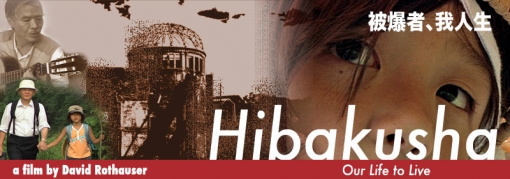
As a filmmaker and a teacher, David Rothauser has been a peace activist for many years but never heard about Article 9 until 2001. His first reaction was: “Article 9 belongs in the U.S. Constitution.” Rothauser then began writing Article 9 essays that were soon published in Tokyo Progressive, Hiroshima Media Peace Institute and PanOrient News.
In 2005 he began production of a feature documentary film, Hibakusha, Our Life to Live, about Japanese, Korean and American survivors of Hiroshima and Nagasaki. The film, narrated by the celebrated Phil Donahue, includes interviews with Japanese, Korean and American hibakusha and international youth participating in the 60th Anniversary Peace Ceremonies in Hiroshima and Nagasaki. The film premiered at the UN Non-Proliferation Treaty Review Conference in 2010 and Secretary General Ban Ki-moon requested copies for the UN Disarmament Educational Department.
Subsequently the film was shown in Hiroshima, Kyoto, Los Angeles, Seattle, Boston, Princeton, NJ, the Martin Luther King Center in Atlanta, Rio de Janeiro and Berlin. Showing the film has proven to be a good way to engage audiences about Article 9 and how important it would be to have a clause similar to Article 9 in the U.S. Constitution. There are now plans to take the film on a world tour and in each city engage audiences in discussions about bringing Article 9 to their respective constitutions.
In the Summer of 2011, Rothauser proposed to the Women’s International League for Peace and Freedom (WILPF) to include Article 9 on their peace agenda at their National Congress. They passed the proposal with a majority vote. In 2012 he was awarded a grant by WILPF to promote the inclusion of a version of Article 9 into the U.S. Constitution.
A number of groups have come in support to promote this initiative to incorporate an Article 9 to the U.S. Constitution, among them American Friends Service Committee, Veterans for Peace, The Smedley Brigade, PAX Brookline and Mass Occupy Brookline.
As part of his efforts to promote Article 9, Rothauser started a blog, Article Nine Network in North America (ANNINA), in partnership with WILPF and the Vancouver Save Article 9 - a group established in May 2005 in Canada to work for preservation, realization, and promotion of Article 9.
Rothauser's thinking is, with Article 9 in both the Japanese and American constitutions, both countries can lead a coalition to support the UN in the abolition of war as a political-economic tool. "Article 9 is the one true link to world peace. It is a shining example for the world to follow, but like a genius flower, it needs global nutrition to bloom in all its glory. We are here to help bring Article 9 to a world starved for peace."
Sign the petition "The End of War-making Is in Sight! Amend Our Constitution" to be delivered to the United States House of Representatives and the United States Senate here.
For more information about the film Hibakusha, Our Life to Live and related initiatives, click here.
David Rothauser can be contacted here.
|
|
Thank you for your interest in and support for the Global Article 9 Campaign to Abolish War.
Peace,
The Article 9 Team
|
|
|
|
|
| ©2008
GPPAC JAPAN All Rights Reserved. |
|